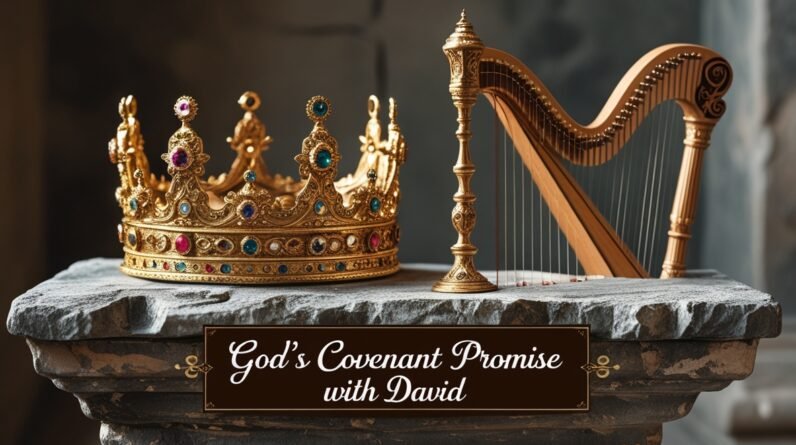God’s Prophecy To David: The Eternal Kingdom Through His Line
In the winding paths of history, few stories stand the test of time like that of King David. Nestled within the rich narrative of the Bible, David’s life stretches from shepherd to sovereign, each chapter painted with vibrant strokes of courage, failure, repentance, and divine favor. However, one of the most intriguing aspects of David’s story isn’t solely about his military conquests or artistic endeavors. It’s about a promise—God’s promise to David—one that extends beyond the temporal throne of Israel to an eternal kingdom.
The Context of the Prophecy
Understanding God’s promise to David requires delving into the specific historical and spiritual context in which it was given. King David reigned over Israel around 1000 BCE, during a time when the nation was seeking to establish itself amid neighboring powers. Before David, the Israelites were often volatile and plagued by internal and external conflicts. It was during David’s reign that Israel experienced unprecedented levels of peace and prosperity. The unity he fostered and the capital he established at Jerusalem would become synonymous with divine blessing.
Yet, despite all his accomplishments, David desired something more—to build a dwelling place for God. This desire set the stage for a significant prophetic moment. As recorded in 2 Samuel, God turned the tables and, instead of permitting David to build a temple, He promised to build a “house” for David through a continuing lineage (2 Samuel 7:11).
The Nature of the Promise
Arguably, the promise itself is the pinnacle of God’s promise to David. In 2 Samuel, God articulates His intentions, stating, “Your house and your kingdom will endure forever before me; your throne will be established forever” (2 Samuel 7:16). This isn’t just any promise; it’s a covenant, a divine contract. Through Nathan the prophet, God reveals that David’s lineage will hold an everlasting significance, heralding an eternal kingdom.
This promise encapsulates several elements:
- Perpetuity: Unlike earthly reigns, which invariably rise and fall, the kingdom promised to David is described as everlasting.
- Legacy: The eternal kingdom will be established through David’s line, highlighting the significance of legacy and divine choice.
- Divine Favor: God’s promise underscores a unique favor bestowed upon David, bound by God’s steadfast love.
The Immediate Fulfillment: Solomon’s Reign
Initially, part of God’s promise to David found immediate fulfillment through his son Solomon. Solomon would indeed ascend the throne, build the temple that David couldn’t, and extend Israel’s influence. His reign was marked by wisdom and wealth, becoming a partial manifestation of the peace and prosperity envisioned. In this, God’s promise to David took a tangible form (1 Kings 5:3-5).
However, even Solomon’s illustrious reign couldn’t encapsulate the full scale of the promise. The eventual division of the kingdom and the subsequent exile pointed to a greater need—a more lasting fulfillment.
Looking Forward: The Messianic Hope
As history unfolded, Israel experienced tumultuous times, often longing for the restoration promised to David. Prophets during and after the exile reminded Israel of this promise, frequently pointing to a figure, a Messiah, who would establish David’s throne in an eternal sense. This anticipation became a source of hope. Isaiah speaks of a “shoot from the stump of Jesse” (Isaiah 11:1), foreseeing not just a return to Davidic kingship, but a transformative era of peace and justice.
Other prophets like Jeremiah and Ezekiel echoed these sentiments, emphasizing the eternal dimension. To them, God’s promise to David wasn’t forgotten, but a beacon guiding Israel through dark times (Jeremiah 23:5).

The Ultimate Fulfillment: Jesus Christ
In the New Testament, the gospels unfold the narrative of Jesus Christ, explicitly linking His genealogy to David. In the opening of Matthew, Jesus is called the “son of David” (Matthew 1:1)—a phrase loaded with messianic expectation. In Jesus, Christians believe God’s promise to David finds its ultimate fulfillment in a kingdom that defies earthly limits.
Jesus’ life and teachings resonate with the essence of this promise:
- A New Covenant: Jesus speaks of a new covenant, inaugurating a kingdom marked by love, mercy, and redemption (Luke 22:20).
- An Eternal Reign: Through His resurrection, Christians hold that Jesus establishes Himself as the eternal King, whose reign transcends time.
- A Transformative Kingdom: Unlike earthly realms, Jesus’ kingdom reigns in the hearts of believers, reshaping existence itself.
Understanding the Kingdom: A Spiritual Reality
While some anticipated a political deliverer, the nature of Jesus’ kingdom was profoundly spiritual. He often spoke in parables, illustrating the kingdom as one that starts small like a mustard seed but eventually encompasses the whole of existence (Mark 4:30-32). This eternal kingdom is not confined by geographical borders but is seated in faith and manifested through transformed lives.
The Dual Nature of the Kingdom
God’s promise to David—and by extension, the kingdom ushered by Christ—embodies both present and future realities:
- Already Here: Jesus declared that the kingdom of God is already at hand (Mark 1:15). This means its influence is immediate, felt in the lives of those who embrace it.
- Yet to Come: The fullness of this kingdom, with its promise of ultimate justice and peace, remains a future hope, akin to a new heaven and earth as described in Revelation.
This dual nature invites followers to live in the “now” of the kingdom, embodying its values of love, justice, and peace, while yearning for its future consummation when all will be restored.
Living the Promise: Implications for Today
For believers, God’s promise to David isn’t just an ancient text but a call to participate in this eternal story. It challenges individuals to reflect on the nature of leadership, legacy, and the transformative power of divine love.
A Call to Leadership
David’s story reminds us of leadership grounded in humility and reliance on God. The promise extended to him reflects on the importance of seeking divine guidance and serving others selflessly, principles reinforced in the teachings of Jesus.
A Legacy of Hope
In a world often marked by fleeting ambitions, the eternal aspect of God’s promise to David calls for a focus on lasting impact—through relationships, justice, and compassion. By participating in the kingdom, each individual becomes part of a larger narrative, one that transcends borders and generations.
Embracing Transformative Love
Central to God’s promise to David and the message of Christ is the call to love as a transformative act. In embracing this, believers are invited to live out the principles of the kingdom, shifting societal paradigms and bringing hope and healing.
The Ongoing Story of the Promise
Ultimately, God’s promise to David isn’t static; it continues unfolding. Believers across the globe echo this story, living in its light, contributing to the expansion of the kingdom in anticipation of its ultimate realization. In embracing this narrative, the call is to remember, engage, and transform.
Explore More
For further reading and encouragement, check out these posts:
👉 7 Bible Verses About Faith in Hard Times
👉 Job’s Faith: What We Can Learn From His Trials
👉 How To Trust God When Everything Falls Apart
👉 Why God Allows Suffering – A Biblical Perspective
👉 Faith Over Fear: How To Stand Strong In Uncertain Seasons
👉 How To Encourage Someone Struggling With Their Faith
👉 5 Prayers for Strength When You’re Feeling Weak

📘 Jesus and the Woman Caught in Adultery – Grace and Mercy Over Judgement
A powerful retelling of John 8:1-11. This book brings to life the depth of forgiveness, mercy, and God’s unwavering love.
👉 Check it now on Amazon
As a ClickBank Affiliate, I earn from qualifying purchases.
Acknowledgment: All Bible verses referenced in this article were accessed via Bible Gateway (or Bible Hub).
“Want to explore more? Check out our latest post on Why Jesus? and discover the life-changing truth of the Gospel!”








